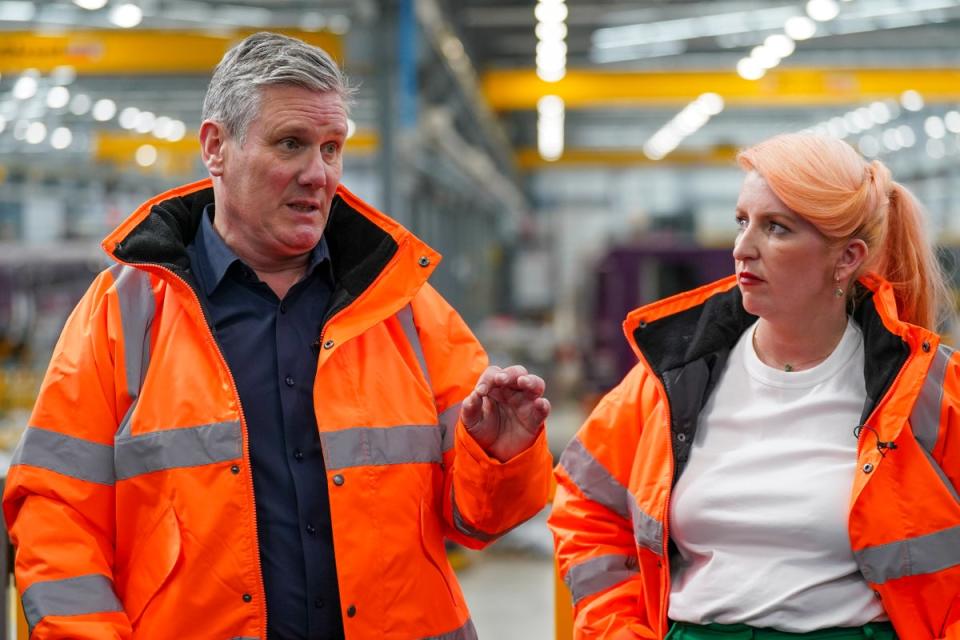Labour fails to rule out fare rises under rail nationalisation plan
The shadow transport secretary has failed to rule out that fares could become more expensive under Labour’s plans to nationalise the railways within five years.
Louise Haigh repeatedly dodged questions on whether ticket prices could rise if it won the election, saying there were no “plans” for increases.
Asked if fares could go up, Ms Haigh said they would be “simpler”, and could not say which journeys would be cheaper.
The party unveiled its plans to transfer rail franchises to public ownership within its first term, calling it the “biggest overhaul to our railways in a generation”.
A new Great British Railways would be responsible for rail infrastructure and awarding contracts to operate trains. However, it would be led by rail experts rather than ministers and civil servants in Whitehall.
Labour also plans to establish a watchdog, the Passenger Standards Authority, to hold GBR to account.
It says the reforms would nationalise the network “without the taxpayer paying a penny in compensation costs”.
Ms Haigh said: “I can’t today set out that we will lower fares, not least because they are incredibly complex and regulation needs reform as well.
“But we have said that we will simplify them, that we will make them more accessible, more transparent and more trustworthy for passengers.

“At the moment passengers have to contend with a dizzying array of different types of tickets and fares and it means they simply don’t trust that they are getting the best value for the journey.”
She added: “Obviously our ambition would be to make fares far more affordable but we really think that one of the things that is keeping passengers off the railway at the moment is the fact that they simply don’t trust or understand the way fares are modelled and that is why simplification is our first priority.”
Sir Keir Starmer said Labour would also end the “boom and bust” cycle for the rail industry, adding that workers at UK-based train makers were “staring down the barrel of devastating job losses”.
Hitachi, in Co Durham, and Derby-based Alstom have both warned their work in the UK is at risk, with potential for job cuts at both plants.
On a visit to Newton Aycliffe, Sir Keir said: “The workforce here at Hitachi is staring down the barrel of devastating job losses. Communities and local businesses across the North East will be hit hard if our proud manufacturing base here is not preserved.
“This was not inevitable. Both in County Durham and at Alstom in Derby, thousands of jobs are in jeopardy because this Tory government has refused to deliver a proper industrial strategy.
“After 14 years of chaos and uncertainty, they have left our rail manufacturing sector teetering on the brink. This is a crisis that must be resolved urgently and must not be allowed to happen again. That’s why, as part of our wider plan to fix Britain’s broken railways, Labour will bring forward a new, long-term strategy for this crucial sector.
“It’s time to end the Tory boom and bust. Labour will give rail manufacturing across Britain the secure, bright future it deserves.”

The Conservatives said Labour’s plans were unfunded and left open questions about the cost to taxpayers.
But Labour won the backing of chief executive Keith Williams, who carried out a review into the railways for ministers and said Labour’s proposals would “take forward the substance of my recommendations to deliver a better railway for passengers and freight”.
A Department for Transport spokesman said: “The transport secretary held a constructive meeting with union representatives of the Hitachi workforce last week and we remain in close contact with the company to secure a sustainable future for rail manufacturing at Newton Aycliffe.
“Rail manufacturing plays an important role in growing the UK economy and delivering better services for passengers. We remain committed to supporting the entire sector on the future pipeline of orders which will be strong in the coming years.”

 Yahoo News
Yahoo News 
